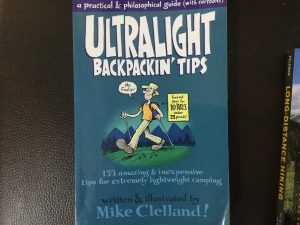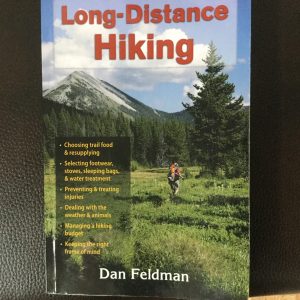One of the first things I bought when I decided to hike the PCT was a paperback book titled “Ultralight Backpackin’ Tips” by Mike Clelland. Two weeks later I bought a second book, “Long-Distance Hiking” by Dan Feldman, as well as a recipe book, “ Lipsmackin’ Backpackin’ “ by Christine and Tom Connors.
I was embarrassed standing in the checkout line at REI, feeling like the stereotypical suburbanite poser who thinks reading a book will teach you all you need to know about thru-hiking. I imagined the other customers were snickering at me, casting side-eyes and laughing. I wanted to tell them I really was an experienced backpacker. Really. I had hiked the John Muir Trail in 18 days….Granted it was years ago – like 20 years ago – but really I am…..was….a hiker.
My suspicions and embarrassment were further confirmed when a good friend saw the books and chuckled. He didn’t say anything, but I knew. 
I was sensitive for good reason: I do have backpacking experience, but the majority of it was in the last century. I camped and backpacked in the Sierras every summer; even multiple trips per year when I lived in CA in the ‘90s. Moving to the east coast cut my backpacking significantly, but I still flew out every summer for a week long trip and the JMT in ‘97. Work got busy after 9/11, so I only did a few 3-4 day trips in the early aughts, and then a single week-long trip in 2015. — That was it for recency. Even though I’d hoped to do some warm up, overnight ‘test’ trips prior to starting the PCT, I just couldn’t squeeze it in. So yes, reading a couple books with tips and advice sounded like a good place to start. I wasn’t starting from square one, but I was – correction – I am no expert.
In my quest for knowledge, I heard about another book, “Pacific Crest Trials” by Zach Davis and Carly Moore. Its subtitle, “A Psychological and Emotional Guide to successfully thru-hiking the Pacific Crest Trail,” pretty well describes the book. From a pre-hike/preparation perspective, which is all I’m currently qualified to have, it’s been an enormous help.
From there, I went to the greatest resource of all time: the inter web.
It sounds absurd but the summer before the PCT I had yet to discover YouTube and the wealth of knowledge (as well as un-knowledge) on it. Up to that point my YouTube experience consisted of funny cat and dog videos Then a co-worker told me about the channel Homemade Wanderlust by a thru-hiker called Dixie. She had just completed the PCT and had informative videos on nearly every hiker-topic you can imagine. I went further down the YouTube wormhole, discovering Darwin on the Trail and Halfway Anywhere. There are dozens of other channels I watched that are too numerous to list. Bottom line, it won’t surprise anyone that YouTube is a great place to find information, recommendations and inspiration prior to starting a thru-hike.
Dr Google then prescribed quite a few informative websites:
Halfwayanywhere.com* PCTplanner.com
Cleverhiker.com. Postholer.com
PCTplanner.com. Lunky.com
pctmap.net Guthookhikes.com
These were the main websites I used in my preparation. Given their popularity I’ll wager the information on these sites will hold. I’ll let you know once I have a few thousand miles under my feet.
Finally, I’d be remiss if I didn’t mention apps and smartphones. In years not too distant, I think many hikers would see going into the woods for 4-6 months as a chance to ditch technology and escape the modern world. Can you imagine that now? Besides being a camera, digital journal, compass and GPS, there are apps like Half Mile and Guthook that provide navigation, mapping, water availability and snow pack reports, among other things. I’m still inexperienced with the apps, but I anticipate they will be my focus (as will the status of my phone’s battery) in the coming months. It may take some intentional effort to disconnect.
* Halfway Anywhere.com does an annual Post-PCT survey that is very informative on gear selection, Resupply strategy and other topics.
** BTW – I do recommend all the books listed, particularly Feldman’s and Davis/Moore’s.